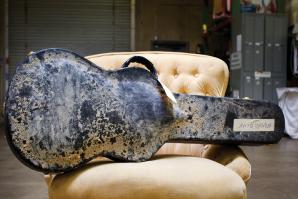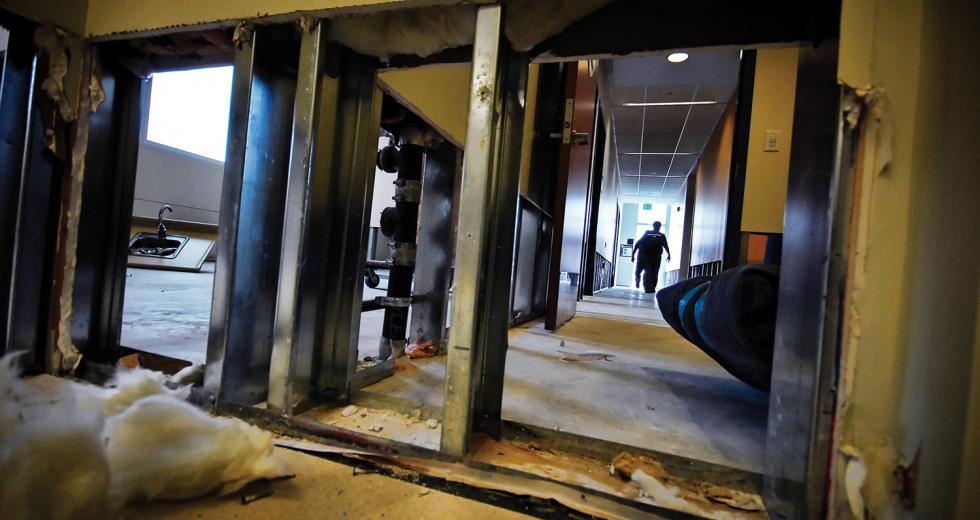Having a comprehensive disaster management plan in place alongside a robust and comprehensive insurance package is vital for any business owner hoping to survive a worst-case scenario.
“Most companies do not recover after a significant disaster because they’re underinsured,” says Leo Grover, owner of Pinnacle Emergency Management, a West Sacramento company specializing in disaster recovery. “When it comes to your business, you can’t just go to your uncle to get coverage. You need a high-end broker who understands your business, and you need insurers who can move fast.”
Specialized brokers and carriers can offer niche products for specific industries and assist in identifying a company’s greatest risks and assets.
To find the best brokers or insurers, the experts say to start with a trade association, most of which have insurance programs tailored for their members. Frequently the association will have done the legwork to assure those providers are reputable and financially stable, but don’t bet your business on it.
“What I see as an agent is that price drives peoples’ buying decisions,” says Chris Rowland, marketing representative for Federated Insurance in Roseville. “And a lot of time the niche agents that specialize might be 5 to 10 or even 15 percent more with their premiums. Business owners look at [property and casualty insurance] as a commodity — why would you pay 10 percent more?”
The value, Rowland says, is seamless coverage tailored to your business. But before you can purchase the right products and services, you have to identify the heartbeat of your business. Is it your phone system? Your CEO? A refrigeration system?
“That is going to be the trigger to either halt business or get you back in business and generate revenue,” he says.
Grover assists his clients in developing disaster mitigation plans for multiple aspects of their businesses, including staff; vital components, such as computers or vehicle fleets; media inquiries and public communication; business personal property, such as work stations and cash registers; and, of course, the building itself.
Once all of the business’s components have been identified and disaster plans are in place, missing insurance products become very clear. Filling those holes can mean the difference between reopening or closing for good.
The insurance coverage you need depends on what you can and cannot afford to self-insure. Every business owner’s threshold for risk is going to be different.
“One big hole we see is third-party liability insurance for third-party discrimination such as [Americans with Disabilities Act] lawsuits,” Rowland says. “Anybody can sue you for not having enough handicapped parking spots, and most insurance companies don’t have coverage for that.”
In addition, employment practices liability insurance can protect against sexual harassment, discrimination and wrongful termination claims.
“And with unemployment the way it is, we’re seeing more of those claims,” Rowland says.
Gabe Whitney, a senior broker at Eclipse Marketing and Insurance Services in Vacaville, says specialized coverage is essential for survival, and it’s not always provided by the largest carriers.
“A lot of these big carriers like Allstate and State Farm focus on mom and pops, retail stores and vanilla operations,” he says. “But when you get into chemical manufacturing and lumberyards, for example, those companies won’t look at them.
“When it comes to your business, you can’t just go to your uncle to get coverage. You need a high-end broker who understands your business, and you need insurers who move fast.”
Leo Grover, owner, Pinnacle Emergency Management
“And a lot of these mainstream carriers exclude certain things like pollution or mold,” he adds. “If you have a water event that results in mold, your general liability might not cover that, so now you have no coverage for clean up. If you spill contaminants into the ground, that is a huge exposure.”
Niche coverage can also provide you with products like fiber liability insurance, which covers any transactions done over the Internet.
“If you promote products online, sell products online and store anyone’s personal information, … and that is somehow released, you are going to get sued,” and it’s not covered by mainstream carriers either, Whitney says.
And even after you have all the necessary insurance in place, Grover says, you can’t rest on it.
“Understanding that you have great coverage and a good response from your carrier is critical, but 90 percent of the time a business owner is going to wait on their carrier to send in the cavalry,” he says. “But if your building floods, how are you going to get the odor out? How are you going to get rid of the mold? That’s up to the business owner, and if you sit on your hands and wait on your carrier to come and mitigate your damage, it’s cash out the window. You have got to have a plan.”
Homeowners insurance policies don’t typically cover business activities, so if you have vital documents or equipment at home worth more than $2,500, you might want to consider additional insurance.
Most insurance carriers do not include business coverage in your homeowner’s policy, but you can usually ask for it, and you should, Whitney says.
“A lot of these carriers will add a business policy endorsement, but it’s limited. Anytime you are doing business and personal assets are left open, we recommend a business-owner’s endorsement with increased limits,” he says.
Most insurance companies offer three types of add-on home-business coverage. A home-office policy covers basic damages, such as losses to computers or documents. A business-owner policy covers a broader range of disasters, including slip and fall coverage, property damage, false advertising and fire. Finally, some insurance companies offer a business endorsement, which piggybacks homeowners insurance by increasing the limits for property protection.
“We always recommend a minimum of a million dollars [in coverage], but always encourage more than that,” Whitney says. “If you have a major lawsuit, you’re going to have $200,000 or $300,000 in defense costs, not to mention whatever the claim is.”
If you have an employee, you must have workers’ compensation. If that employee is your spouse, you can choose not to insure them, though Whitney says that is a bad idea.
“You have the option of insuring [your spouse], and you can even insure yourself, which we recommend, though you are not obligated,” he says. “Workers comp covers 100 percent of medical costs and lost wages. It’s Cadillac coverage, and it will cost you but the rare few that cover themselves are smart.”
Recommended For You

Proper Precautions
Preparing for and responding to unpredictable disasters
The last sound anyone wants to hear is a firetruck siren. But last fall, that unsettling sound rang in the middle of the night as a three-alarm fire leaped from an apartment building in midtown Sacramento to the roof of J Street Recorders, home of the multiplatinum blues metal band Tesla.

Fire Drill
A proactive approach to managing fire systems could save you thousands
The walls are freshly painted. Fashionable new light fixtures hang from the ceiling. It’s got the right zip code, the right floor plan, the right price. Think you’re ready to buy that commercial property? Unless you have peered behind those walls and assessed all that’s happening above those lights, fire protection experts say you shouldn’t sign on the dotted line.



